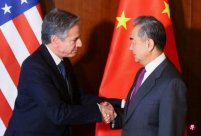
The U.S. government announced two allegations of different cases on Wednesday, which aims to implement the laws of cutting off key technology transfer.The United States has taken a wide range of actions to prevent the military efforts and weapons production of competitors, which is part of it.
One of the prosecutions is aimed at a U.S. citizen born in China who was arrested for stealing commercial secrets from a private company.According to court documents, the confidential technology "if it is obtained by international behavior, it will endanger US national security."
A indictment submitted by the Ministry of Justice to the US Court of California stated that the stolen material will help develop a technology that enables the heavenly system to track ballistic missiles and hypersonic missiles.U.S. officials said that acquiring technologies related to the tracking of hypersonic missiles and missile tracking are one of the primary tasks of the Chinese military.
In another indictment, the US government accused two Iranian men trying to illegally purchase American goods and technology for the Iranian aerospace department.Court files show that these technologies involve fire equipment and flame detectors.
These allegations are the latest cases aimed at cutting legal operations in Iran, Russia and China to obtain American technology.One year ago, the US Department of Justice and the Ministry of Commerce established the "Anerovised Technology Strike Power Group" to implement the export control law and destroy Iran's weapons and equipment produced by Iran's agency organizations for Russia and Iran.This is also to prevent China's advanced military technology.
Officials of the combating force group will meet with Phoenix this week with Ukraine to discuss how to cut off the parts of American technology and American design to Russia, Iran and China.
"Our task is to prevent our country's most sensitive technology falling into the most dangerous people in the world," said the Ministry of Commerce, the assistant minister of export law enforcement Matthew Axel Rhoder."The national actor is trying to obtain the advanced technology of the United States in order to modernize their army, so as to surpass our army and change the power balance of the world. This is where the interest relationship is."
The export control of the United States for Beijing tries to prevent the Chinese government and Chinese companies from obtaining advanced chips that can be used to develop new military capabilities.However, Iran is trying to obtain less cutting technology and chips, and these technologies and chips have not been stopped by exports to many other countries.
Iran uses these chips to manufacture drones to provide Russia for Ukraine War, and also provides Hamas and Hussean rebels. The latter used these drones to attack the Red Sea merchant ship.
The Assistant Minister of Justice of the Ministry of Justice, Matthew Olson, said: "Iran's malicious activity not only destroys the stability of the region, but also supports other malicious acts such as Russia."
When Olson visited Kiev in November, Ukrainian officials showed him evidence of U.S. technology to attack Ukraine.He said that the interview expanded intelligence sharing between the two countries to support US law surveys.
US officials said it is difficult to judge the direct effect of export control.For example, Russian missile production initially slowed down due to export restrictions.However, as Moscow regained economic focus on wartime production, its missile production has resumed or even exceeds the ability of pre -war.
Iran's UAV output is high and low, which may be because the United States puts pressure on its supply chain.U.S. officials said the costs and difficulties of these measures have greatly increased the cost and difficulty of supplying UAVs for their agents and Russia.
"When we enforce the laws of sanctions and export control, we hope to let bad actors including Russia and Iran pay the price," Olson said."We need to accuse them to open them publicly, and arrest them if possible."
Olson said that law enforcement operations also have a chain reaction.Seeing how Iran, Russia or China tries to avoid rules, it will take more powerful compliance measures to ensure that they will not be used to smuggle chips.
He said: "Enterprises will notice criminal law enforcement and implement a stricter compliance system."
In this case involving China on Wednesday, 57 -year -old man Gong Chenguang (sound) was charged with the crime of stealing commercial secrets.Prosecutors accused him of stealing documents from a technology company last year, but did not disclose the company's name.The government's indictment did not explain the technology -to identify the missile launch and track the difficult objects in space -whether it was sent to China.
But the prosecutor wrote in the indictment that Gong Chenguang had no software to view the documents he took from the company.Some of these documents are marked as proprietary documents, and others are marked as export control files.
Gong Chenguang once worked for national defense contractors and had professional knowledge of developing computer circuits. He had previously sought funding from the Chinese government and contacted Chinese government officials through various talent plans.The Chinese government uses these projects to discover those who help develop economical and military capabilities.
The case involving Iran is not directly related to the production of the country's drone, but it is related to the country's aerospace industry.
79 -year -old Aberza Bazazaki and his 43 -year -old son Mohammed Reza Bazaki were accused of setting a complex plan to avoid export laws and transport aerospace equipment to IranAnd to transport technology to Europe to hide its ultimate destination.




